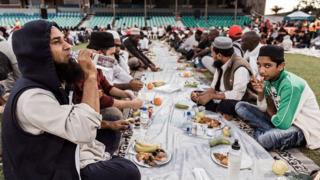Ramadan: Fasting safely during coronavirus crisis
During Ramadan, many Muslim people abstain from eating and drinking between sunrise and sunset. …

 Image copyright Getty Images
Image copyright Getty Images Millions of people around the world will be observing the Muslim holy month of Ramadan under lockdown this year.
Each year, many practising Muslims fast from dawn to sunset for the whole of the lunar month – either 29 or 30 days – as part of the ritual of dedicating oneself to contemplation and prayer.
Fasting is obligatory for all adult followers of the faith who are able to safely go without food and drink.
But there are some considerations when it comes to fasting during a pandemic.
Fighting infection takes a lot of energy, University of Sussex immunologist Dr Jenna Macciochi says.
And prolonged periods of not eating or drinking can weaken the immune system.
So it is important to make sure you get enough calories during the hours you are permitted to eat, including enough:
- macronutrients – carbohydrates, proteins and fats
- micronutrients, such as vitamin C and iron
And it is a good idea to eat a variety of food, including lots of different coloured vegetables, fruits, pulses and legumes.
Both under- and over-eating can affect the immune system, so you can help yourself by staying in “energy balance”, according to Dr Macciochi.
There is also some risk in becoming dehydrated, as it can affect the mucus that lines your airways and acts as a protective barrier.
But looking after other aspects of your health by trying to get enough sleep and exercise and de-stressing where possible can help keep your immune system functioning as it should.
More simply though, the best way to protect your health is preventing exposure to the virus.
Much of the risk can be avoided by handwashing and, for those who can, staying at home.
What about people with health conditions?
People who are ill, including those with Covid-19, are exempt from fasting.
And it is not recommended for people with certain long-term conditions such as diabetes with complications.
Diabetes UK head of care Daniel Howarth said the decision was “absolutely a personal reflection” but there were some precautions people with well managed conditions who wanted to fast could take, including eating slower-release carbohydrates, such as wholegrain bread and rice, and testing your blood sugar more often.
What about healthcare workers?
The Muslim Council of Britain has published guidance, saying “healthcare staff required to provide care to Covid-19 patients, at real risk of dehydration and making clinical errors due to wearing PPE [personal protective equipment] and long shifts” are exempt from fasting.
Can fasting be good for your health?
Although not consuming enough calories in a day can lower your immune response, the effect of fasting on the immune system is not straightforward.
The immune system is not one thing with an on/off switch.
It is a complicated series of mechanisms that have to be kept in balance.
Fasting releases the stress hormone cortisol, which can suppress some immune responses.
But there is also good evidence from studies in mice that intermittent fasting of the kind practised during Ramadan can speed up the body’s process of regeneration, causing old cells to die and be replaced with new ones.
However, it is difficult to translate this evidence to humans.
And it is not clear how long you would have to fast to replicate the effect.
Follow Rachel on Twitter

